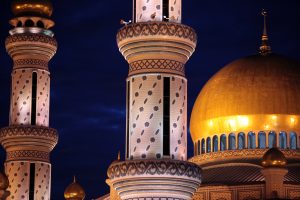For a brief period in 2019, the tiny Southeast Asian kingdom of Brunei captured international headlines. Hollywood actor George Clooney led a campaign calling for the boycott of nine international hotels, including ones in Beverly Hills, London, Paris, and Milan, because they were owned by a subsidy of Brunei’s government, the Brunei Investment Agency (BIA).
The campaign was in response to new legislation introduced in Brunei that year, in particular a Shariah Penal Code (SPC), for which the penalties included “stoning and whipping to death any of its citizens that are proved to be gay.” In response to the outrage Hassanal Bolkiah, the Sultan of Brunei, issued a “de facto moratorium” on the death penalty, and the country disappeared from global news coverage.
The moratorium is still in place, but the human rights situation in Brunei remains appalling. Of particular concern are its harsh restrictions on freedom of religion or belief, with Muslims forced to adhere to strict rules based on the government’s interpretation of Islam, while non-Muslims are discriminated against and unable to practice their religious beliefs freely.
As the chair of the Association of Southeast Asian Nations (ASEAN), this week Brunei is hosting (albeit remotely due to COVID-19) the bloc’s 38th and 39th summits, with conversation expected to be centered around the political crisis in Myanmar, where the military grabbed power in February and plunged the country into turmoil and terror.
While the desperate situation in Myanmar deserves to dominate the agenda, the rare spotlight on Brunei, which will hand the ASEAN baton to Cambodia at the culmination of this week’s events, now also presents the opportunity to scrutinize its dreadful human rights record, particularly related to freedom of religion or belief.
Brunei is an absolute monarchy in which the sultan has exercised executive power since independence from the United Kingdom in 1984. It is a Muslim majority country, with an estimated 80 percent of its 460,000 people practicing Islam, with the rest made up of Christians, Buddhists, and other religions, including those with indigenous beliefs.
According to its Constitution, the official religion is the Shafi’i School of Islam, while “all other religions” may be practiced in “peace and harmony.” In practice, however, this is far from the case.
The SPC, which came into full effect in 2019, and which is in force in parallel with the common-law-based Penal Code, enforces a hardline version of Islamic law on all people in Brunei, denying them the right to freely practice and express their faith outside the state’s own interpretation.
The code allows for torture and ill-treatment, with penalties including corporal punishment, such as stoning or whipping, while those found guilty of theft face potential amputation of their hands or feet.
There are many other deeply problematic issues with the SPC, particularly related to freedom of religion or belief.
For example, it is illegal to persuade a Muslim to change religions, to “propagate” religion other than Islam to a Muslim or person having no religion, or to persuade a person with no religion to convert to a belief system that isn’t Islam.
Exposing a Muslim child or a child of non-religious parents to beliefs and practices of a religion other than Islam is also illegal, with punishments including fines of up to $20,000 Brunei dollars (US$14,800) as well as up to five years in prison. As a result, the government has demanded that businesses remove Christmas decorations, and prevented children from wearing clothes associated with Christmas, including Santa hats.
Muslims also face heavy restrictions under the SPC. For example, irtidad, which refers to knowingly or willfully speaking or acting contrary to the creed of Islam, is illegal under a number of clauses, with punishments including imprisonment or whipping. Muslims are legally obliged to attend Friday prayers, and those not doing so face a potential fine.
Religious groups that the government considers “deviant” are also banned, including the Ahmadiyya Muslim Community, the Baha’i Faith, and Jehovah’s Witnesses. Official government rhetoric portrays these groups as threats to Islam.
Religious freedom has long been restricted in Brunei. For example, in the 1960s the State Mufti Department issued a fatwa that “strongly discourages” Muslims from assisting non-Muslim organizations in propagating their faith. Authorities reportedly use this fatwa to justify denying permission to non-Muslim faith organizations for a range of religious activities, including the expansion, renovation, or construction of new facilities.
It’s important to note that these restrictions not only violate people’s right to freedom of religion or belief, but have broader implications on other rights, including those to life and liberty, freedom from torture, gender discrimination, and free speech. In short, they leak into every aspect of people’s lives.
While extremely limited, the moratorium on the death penalty introduced in 2019 demonstrated that the Sultan of Brunei does care about public opinion.
The oil-rich sultanate has strong relations with many democratic governments around the world, and these partners – which the Sultan is hosting this week as chair of ASEAN – must liaise with authorities in Brunei and work toward ending discrimination against religious minorities and revising a legal framework to ensure that all people in Brunei can practice their religion free from government intervention and ill-treatment.

































